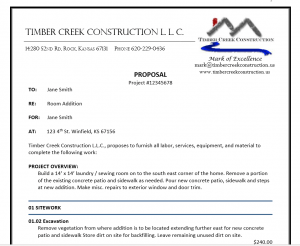Because Admin and Finance are Out of the Contractor’s Comfort Zone
Most trades people like doing physical work, not paperwork. They like building things, not sitting at a desk making proposals or putting numbers in spreadsheets.

Avoiding paperwork is one of the biggest reasons construction companies struggle to stay in business.
They may be the most skilled craftsman out there but they consistently struggle to keep the business afloat. This includes things like –
- Losing money due to under bidding projects
- Not enough money to pay taxes
- Can’t afford to have repairs done to the company pickup
- Projects running over budget
- Upset customers due to poor communication
- Disconnection with production crews due to poor communication
An example of this is an email I received just this past week from a foundation repair contractor.
“I need help with all aspects of the business end of the business, and definitely with organization and systems. It’s easier for me to pick up a house than it is to figure out what to charge for doing it.”
All these problems can be solved with a good foundation that includes paperwork.
Whether it’s a dislike for doing paperwork or simply not knowing how to do it, paperwork doesn’t have to be as scary as it first appears.

It requires doing something different. If you keep doing what you’ve always done, you’ll keep getting what you’ve always got. (Variation of a Steven Covey quote) This reminds me of the Geico commercial where the group of young people choose to hide behind the chainsaws, rather than getting in the running car.
Recently we talked about the importance of building your business on a solid foundation. I told you that this foundation consisted of three piers, one of which is Administration/Finance. Let’s break this foundational pier down and see what it’s built of.
Administration – The process or activity of running a business or organization that includes but is not limited to –
- Computer Systems
- Team Member Records
- Team Member Policies and Benefits
- Office Support
- Office Maintenance
- Information Archiving and Distribution
- Data Processing
- Communications
- Contract Preparation
Finance – The management of money that includes but is not limited to –
- Budgeting
- Invoicing
- Cash Flow Forecasting
- Financial Reports
- General Bookkeeping
- Accounts Payable
- Taxes
- Banking
Each of the things listed here has a mix of administration and financial aspects. A good example of this overlap is the Blueprint for Building a Better Proposal, which we’ve previously discussed in a series of blog posts and podcasts.
As we move forward discussing this foundational pier, I will share some of the different documents and processes that we’ve developed and regularly use at Timber Creek Construction.
The first one we’ll discuss is called the Job List. This is an Excel spreadsheet that serves several purposes, some of these are:
- Generating consecutive and project specific job numbers
- Tracking current total project bid amounts at present
- Tracking current total signed projects at present
- Tracking current total collected projects at present
- Percentage of jobs signed
- Percentage of dollars signed per dollars bid
- Percentage of dollars collected per signed
- Average dollar amount of projects bid
- Average dollar amount of projects signed
- Average dollar amount of projects collected
- Projected timeframe needed to do the work based on annual revenue goal
- Projected date work should be done based on annual revenue goal
We’ll dig into the Job List deeper next time.
I know, I know…this seems a little scary, but it doesn’t have to be with some help. Just remember that if your business doesn’t have a good foundation, it may not stay standing.

Check back in later to learn more about the Job List.









 He asked if this was a problem. My partner told him no, it wasn’t a problem. Guess what…
He asked if this was a problem. My partner told him no, it wasn’t a problem. Guess what…
 What if I told you that there is such a system and you could have it? There is and it’s going to become available in the next few months. Over the next several weeks we are going to breakdown the system, go through the different documents and processes in detail and explain how it works.
What if I told you that there is such a system and you could have it? There is and it’s going to become available in the next few months. Over the next several weeks we are going to breakdown the system, go through the different documents and processes in detail and explain how it works.